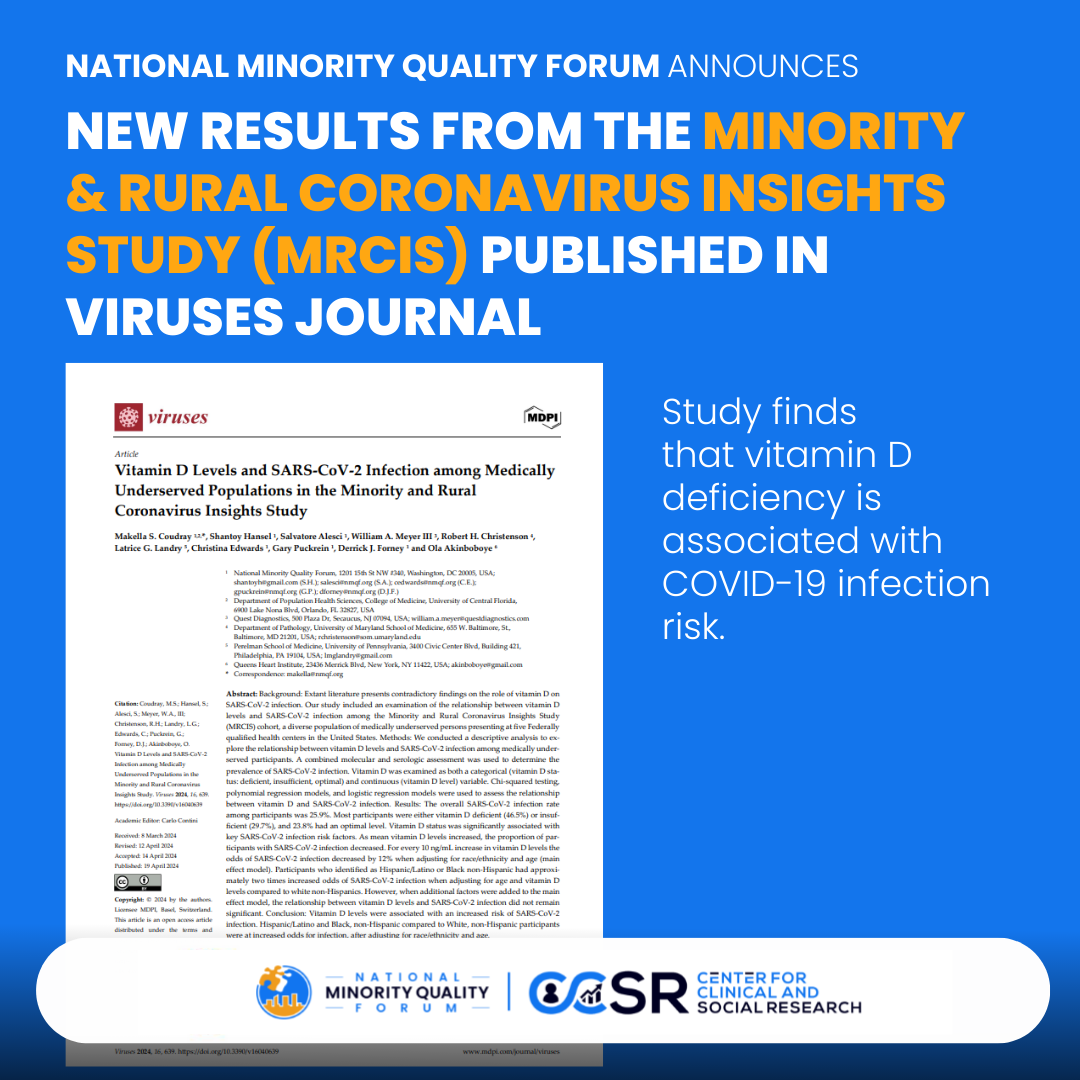
June 06, 2024
By Akeia Blue
National Minority Quality Forum Educates Congressional Staffers on the Importance of Providing Medicare Access to Anti-Obesity Medications
Read More

FOR IMMEDIATE RELEASE
Media Contact
Akeia Blue
ablue@nmqf.org
202-223-7566
WASHINGTON, D.C. (May 9, 2024) — In a landmark effort to ensure equitable healthcare The National Minority Quality Forum, Center for Clinical and Social Research (CCSR) has announced the recent publication of the results from the Vitamin D Levels and SARS-CoV-2 Infection among Medically Underserved Populations in the Minority and Rural Coronavirus Insights Study in the Viruses journal. MRCIS, a five-year pivotal study launched at the height of the COVID-19 pandemic, focuses on the spread of the viral disease and its impact in minority and rural communities, with the goal of uncovering potential health disparities .
The current study found that vitamin D deficiency is significantly associated with COVID-19 infection risk, highlighting a potential risk factor for the disparities in COVID-19 infection rates across race and ethnicity. Vitamin D deficiency is prevalent in the United States, particularly among Black and Hispanic populations, which could be caused by several different factors, including melanin interfering with the absorption process, diets that are not high in vitamin D and certain medicines.
More precisely, the study found that non-Hispanic, white participants had the highest levels of vitamin D and lowest rate of COVID-19 infection. In sharp contrasts, Hispanic participants had the lowest vitamin D levels and highest rates of COVID-19 infection, while Black participants fell in between. Additionally, for every 10ng/mL increase in vitamin D levels, the odds of COVID-19 infection decreased by 12%.
“Vitamin D, often overlooked, plays a crucial role in modulating our immune responses. While further validation of the findings discussed here is warranted, our study underscores the need to explore effective ways to increase vitamin D levels as a tailored public health strategy to help lower COVID-19 risk in Hispanic and Black communities t,” says Dr. Salvatore Alesci, NMQF Senior Vice President of CCSR.
Key Takeaways in the Vitamin D Report
The MRCIS study engaged over 3,200 participants from five Federally Qualified Health Centers (FQHCs) across the country (i.e. Florida, California, Illinois, Ohio, and Louisiana). This makes it the largest multi-site, community-based epidemiologic investigation on clinical and social determinants of health associated with the COVID-19 pandemic in minority and rural communities in the United States. Study participants completed a baseline survey, and received at no cost a polymerase chain reaction (PCR) and antibody test to assess COVID-19 infection status, as well as other laboratory tests. Blood samples were shipped and stored at a biobank which will allow for future investigations.
The CCSR team continues to analyze data from the MRCIS study to further examine differences in COVID-19 experience among minoritized communities and the general population and its impact. Ongoing studies include:
The full paper can be viewed on the Viruses journal website here: https://www.mdpi.com/1999-4915/16/4/639. To learn more about the MRCIS study, please contact Dr. Makella S. Coudray, PhD, MPH, and Dr. Derrick J. Forney, PhD, MPH, Co-Leads of the MRCIS study and visit nmqf-ccsr.org.
About National Minority Quality Forum
The National Minority Quality Forum (NMQF) is a 501(c)(3) not-for-profit research and advocacy organization based in Washington, DC. The mission of NMQF is to reduce patient risk by assuring optimal care for all. NMQF’s vision is an American health services research, delivery and financing system whose operating principle is to reduce patient risk for preventable morbidity and mortality while improving quality of life.
For more information, please visit www.nmqf.org.